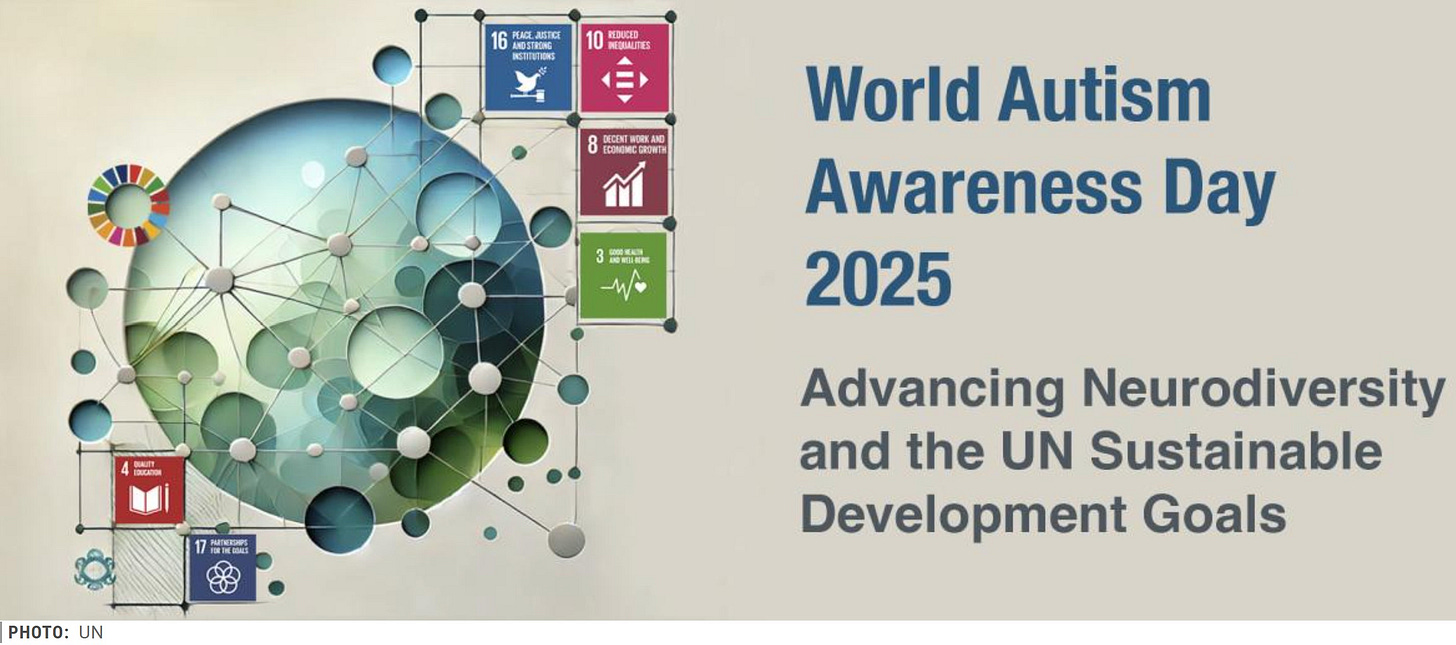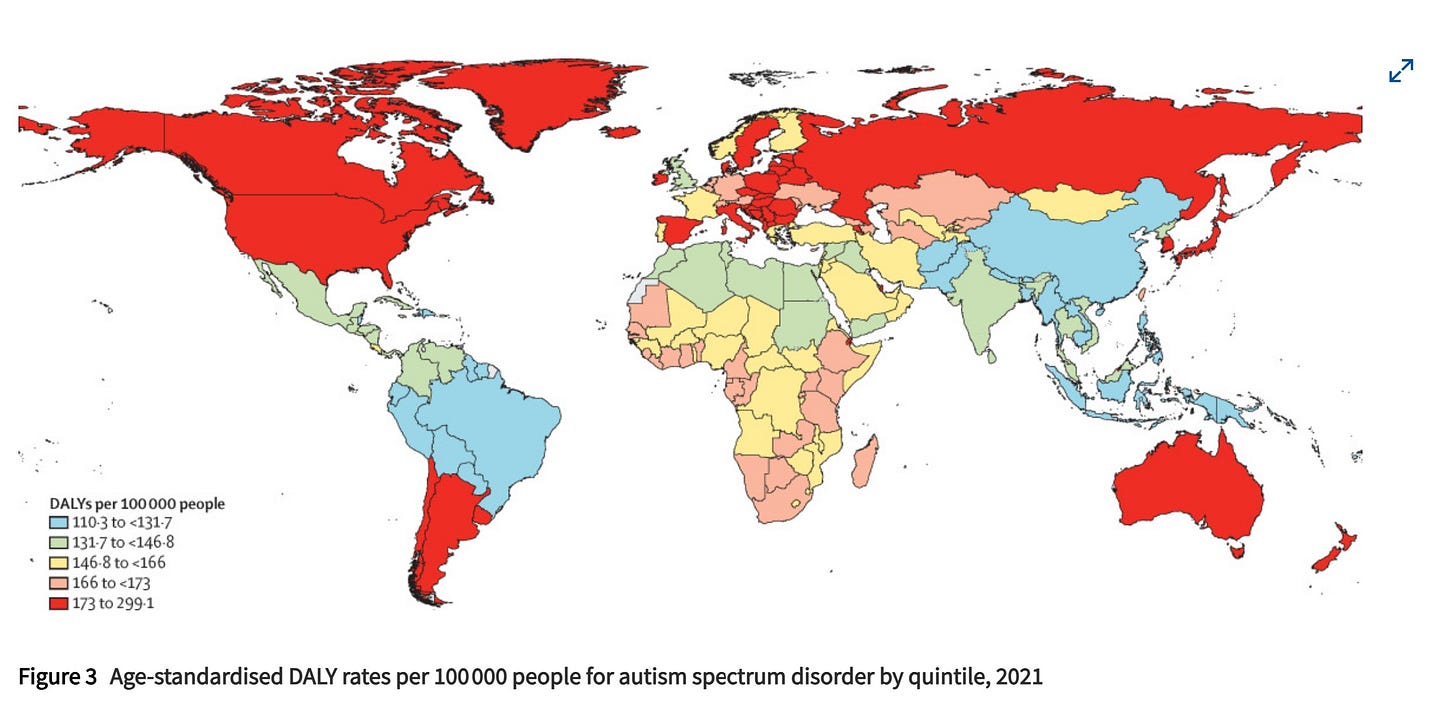World Autism Awareness Day 2025
United Nations to Advance Neurodiversity with Sustainable Development Goals
Since the United Nations General Assembly designated April 2 as World Autism Awareness Day (WAAD) in 2007, global perspectives on autism have significantly expanded. The UN continues to advocate for the full realization of human rights and equal societal participation for autistic people. Over time, the movement has evolved from awareness to acceptance and action, with many countries now recognizing April as Autism Acceptance Month.
The UN 2025 WAAD event, "Advancing Neurodiversity and the UN Sustainable Development Goals (SDGs)," highlights how inclusive policies can drive meaningful change for autistic people while contributing to broader global sustainability efforts.
Bringing together global experts, policymakers, and autistic voices, the event will focus on inclusive healthcare, quality education, workplace accessibility, reducing inequalities, and designing autism-friendly communities. Organized by the Institute of Neurodiversity (ION) with support from the United Nations Department of Global Communications, discussions will emphasize accessibility, equality, and innovation across multiple sectors. As the largest neurodiversity initiative worldwide, ION advocates for equal opportunities, and promotes autism education and acceptance.
A Shifting Perspective on Autism: From History to the Present
The modern understanding of autism has evolved through shifting perspectives in medicine, psychiatry, psychology, genetics, and education.
In Autism: A Social and Medical History, Mitzi Waltz explores how scientific evidence and cultural beliefs have shaped the treatment and societal perception of autistic people. Autism’s historical narrative has frequently been dictated by external voices, often excluding autistic perspectives from discussions about their own experiences.
In recent years, autistic voices have gained prominence through self-advocacy and collective action. However, despite this progress, institutions and organizations have been slow to integrate their insights, leading to ongoing struggles for recognition and inclusion. This lack of integration has been especially harmful to a generation of autistic adults who grew up without proper diagnosis, support, or understanding—often referred to as the "lost generation."
The Lost Generation of Autistic Adults
Many adults remain undiagnosed due to historical misconceptions and shifting diagnostic criteria. The concept of a “lost generation” of autistic adults has emerged as researchers and clinicians uncover cases of individuals who, due to outdated understandings, were overlooked or misdiagnosed with other conditions.
Autism spectrum conditions were historically diagnosed in childhood. However, recent studies highlight the challenges adults face in obtaining a diagnosis due to the lack of developmental history, the effects of learned masking behaviors, and the high prevalence of co-occurring conditions (Lai & Baron-Cohen, 2015; Fusar-Poli et al., 2022). Women, in particular, have been disproportionately underdiagnosed due to gendered biases in diagnostic criteria, among other reasons.
A 2022 study found that adults diagnosed with autism later in life often spent over a decade navigating misdiagnoses before receiving an accurate assessment (Fusar-Poli et al., 2022), emphasizing the need for a more nuanced diagnostic approach.
On a global scale, autism ranks among the top contributors to non-fatal health burden for people under the age of 20, according to groundbreaking findings from the Global Burden of Diseases, Injuries, and Risk Factors, published in December. This research shows how 61.8 million people worldwide—or about one in every 127—are autistic.
As understanding evolves, personalized and precision-based medical approaches are emerging, integrating biological, behavioral, and therapeutic interventions. Creating autism-friendly environments, expanding diagnostic access, and incorporating neurodivergent perspectives into policy are crucial steps toward addressing the needs of autistic adults and ensuring equitable support across lifespans.
Advances in Autism Research and Looking to the Future
In recent years, autism research has made significant strides in both diagnosis and treatment, driven by advancements in genetics, neuroscience, and emerging technologies. The increasing recognition of autism as a spectrum with highly individualized presentations has paved the way for more precise and tailored diagnostics to emerge.
However, despite these advancements, challenges remain in fully understanding the complexities of the spectrum and ensuring equitable access to effective treatments and support systems. Looking to the future, researchers and policymakers are focusing on precision medicine, technology-driven therapies, and the role of social policy in improving outcomes for people on the spectrum (Qin et al., 2024).
Scientific progress alone is not enough. Social policy plays a critical role in translating research findings into meaningful improvements in the lives of autistic people and their families. Governments and advocacy organizations are recognizing the need for policies that support the expansion of the autism research focus, along with inclusive education and employment initiatives. Policies promoting interdisciplinary collaboration and global research partnerships can accelerate breakthroughs in understanding autism’s complex causes, treatments, and inclusive designs.
A Future Focused on Inclusion and Empowerment
The future of autism research is not just about advancing medical and technological interventions. It’s also about fostering an inclusive society where autistic people can be positioned to thrive. As awareness of neurodiversity grows, workplaces, schools, and communities must continue to evolve and embrace an assets-based perspective to recognize both our strengths and challenges.
Many researchers are starting to believe, with a growing body of research and advocacy, the future of autism care and inclusion is poised to be more personalized, effective, and empowering than ever before. The path forward requires a commitment to interdisciplinary collaboration, technological innovation, and policy reform, all guided by the principle that autistic people deserve respect, understanding, and opportunities to reach their full potential.
As we mark World Autism Awareness Day, it's crucial to acknowledge the significant strides being made on a global scale. The UN, through its various agencies and initiatives, is championing neurodiversity more every year. This is evident in the growing emphasis on inclusive education and employment practices, the promotion of accessible technologies, and the fostering of respectful dialogue.
Research is continually expanding our understanding of autism, challenging outdated assumptions and paving the way for more effective interventions and supports. Simultaneously, the lived experience of autistic people and their families is informing policy, shaping services, and driving a deeper understanding of the unique strengths and perspectives found in the autistic community. This World Autism Awareness Day, we recognize these advancements and reaffirm our commitment to a future where neurodiversity is embraced as an essential part of a functional society.
References
Fusar-Poli, L., Brondino, N., Politi, P. et al. (2022). Missed diagnoses and misdiagnoses of adults with autism spectrum disorder. Eur Arch Psychiatry Clin Neurosci .272, 187–198.
Howlin, Patricia. (2021). Adults with autism: Changes in understanding since DSM-III. Journal of Autism and Developmental Disorders, 51. 4291–4308.
Lai MC, Baron-Cohen S. Identifying the lost generation of adults with autism spectrum conditions. Lancet Psychiatry. 2015 Nov;2(11):1013-27.
Mintz, M. (2017). Evolution in the Understanding of Autism Spectrum Disorder: Historical Perspective. Indian J Pediatr. 84, 44–52.
Qin, L., Wang, H., Ning, W., Cui, M., & Wang, Q. (2024). New advances in the diagnosis and treatment of autism spectrum disorders. European Journal of Medical Research, 29, Article 322.
Santomauro, Damian F et al. (2025). The global epidemiology and health burden of the autism spectrum: Findings from the Global Burden of Disease Study 2021. The Lancet Psychiatry. 12(2), 111–121.
Waltz, M. (2013). Autism: A Social and Medical History. Palgrave Macmillan.
Rosen, N.E., Lord, C. & Volkmar, F.R. (2021). The Diagnosis of Autism: From Kanner to DSM-III to DSM-5 and Beyond. Journal of Autism and Developmental Disorders. 51, 4253–4270.





There is much work to be done in educating the general population with respect to autism. Better comprehending the traits of autistic people would greatly improve workplace dynamics. Employers, in particular, would benefit from more knowledge in this regard, in particular when it comes to the interview / hiring process. The question in my mind is how much training are HR personnel receiving regarding autism to offer guidance to managers.